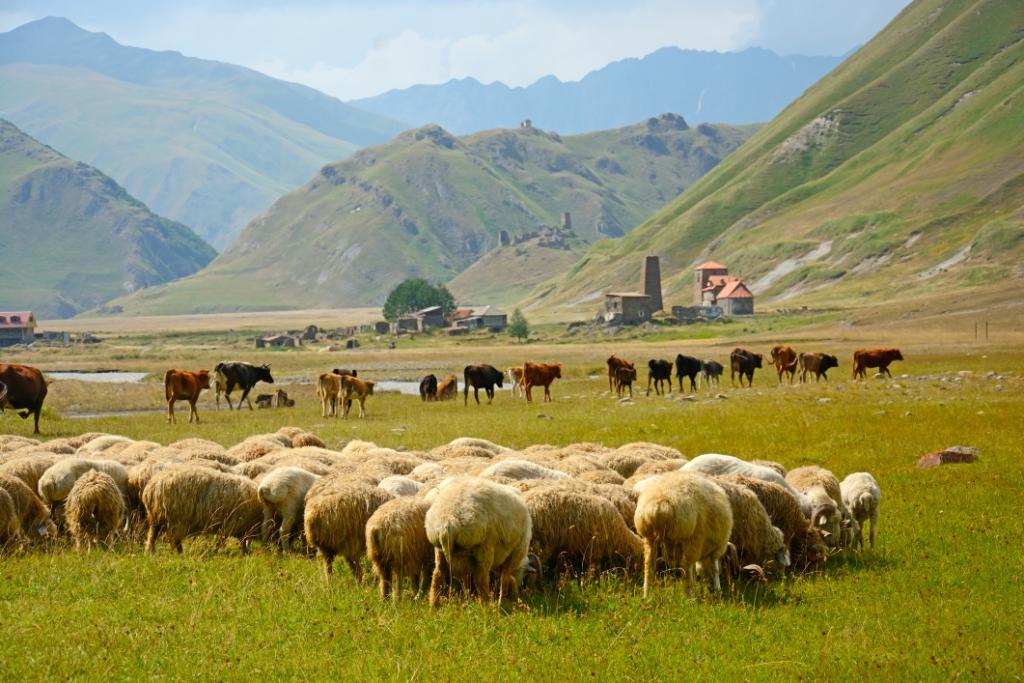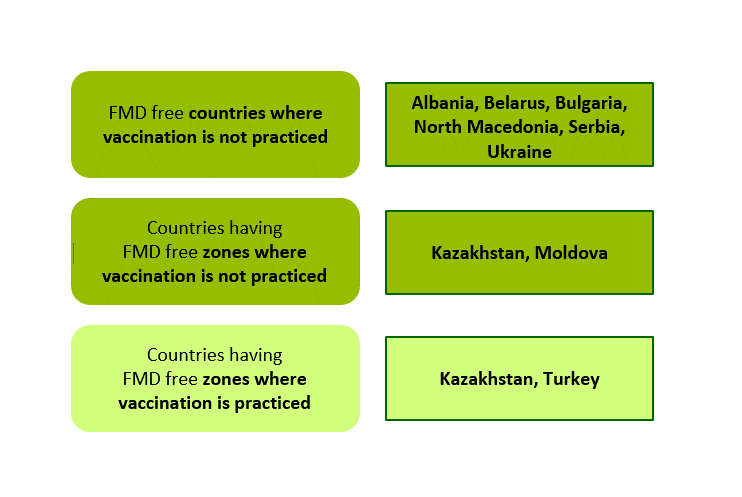The regional training workshop, OIE Procedures for the Official Status Recognition and Endorsement of National Official Control Programmes with regard to PPR and FMD, and maintenance of FMD official free status, covered these issues and more. At the initiative of the OIE, with the generous support of the Government of Kazakhstan and the Directorate-General for Health and Food Safety of the European Commission, representatives of the Veterinary Services of 19* European countries met in Almaty, Kazakhstan 16-18 April, 2019 to discuss the matter in detail.
Albania, Armenia, Azerbaijan, Belarus, Bulgaria, Georgia, Israel, Kazakhstan, Kyrgyzstan, North Macedonia, Moldova, Montenegro, Russia, Serbia, Tajikistan, Turkey, Turkmenistan, Ukraine, and Uzbekistan
FMD was the first disease for which the OIE established an official list of free countries and zones. The first official list of OIE Member Countries recognised as free from FMD, without the use of vaccination, was published in May 1996.
The OIE has defined a transparent, science-based and impartial procedure for the recognition of FMD disease status of its Member Countries. FMD is still widespread throughout the world, particularly in Asia, Africa and the Middle East. In the era of globalisation and global increase in travel, trade and transportation of goods, FMD remains a permanent threat to all countries. To date, more than 90 OIE Member Countries have not been officially recognised as being FMD free. OIE experts have stressed the importance of severe import and cross-border animal movement controls and surveillance, early detection and warning systems, and preventive measures to avoid the introduction of FMD to countries, in particular those previously free from FMD.
Participating countries officially recognised by the OIE as being FMD free
Only nine of the 19 countries participating in the workshop have been officially recognised by the OIE as being FMD free (Albania, Belarus, Bulgaria, Kazakhstan, Moldova, Republic of North Macedonia, Serbia, Turkey and Ukraine). Moreover, at the time of writing, 6 May 2019, Russia’s FMD-free zone status had been suspended.
This workshop allowed for an exchange of experiences and discussions on lessons learned, and was welcomed by both experienced participants and Member Country representatives that had not yet applied for official recognition of disease status through the OIE.
With regard to FMD, participants clearly understood the importance not only of the official recognition of FMD status, but also of maintaining this official status once achieved. Case studies demonstrated how OIE standards are applied within the process, as well as the requirements that must be complied with as per the OIE Terrestrial Animal Health Code (Terrestrial Code) for FMD. Attendees also had the opportunity to critically evaluate their ongoing efforts, as well as the structure of future ones, for official recognition and maintenance of FMD-free status.
Since 2013, Member Countries have been able to apply to the OIE for official recognition of freedom from PPR for a whole country or for a zone. They can also apply for their PPR national official control programme to be endorsed. In 2018, 56 OIE Member Countries and one zone within a country were officially recognised as free from PPR. As yet, however, the OIE has not endorsement any official PPR control programme. Moreover, none of the countries represented at the workshop had been officially recognised as having a PPR-free status.
Participants were provided with detailed information on the Terrestrial Code requirements for PPR, and the support and services provided by the OIE Reference Laboratory for PPR in obtaining official recognition of PPR-free status. Some participating countries noted that PPR had never been reported in their country, thus declaring their historical freedom from the disease. Through this technical workshop, those countries already claiming historical freedom from PPR were encouraged to prepare a file, in accordance with the OIE procedure, for official recognition of disease status, while complying with all requirements specified in the OIE Terrestrial Code for PPR.
The attending OIE experts on FMD and PPR clarified the requirements for obtaining and maintaining disease-free status and highlighted common shortcomings in countries’ submissions. They emphasised the importance of including well-documented evidence to substantiate statements made within the applications. Participants found this information very useful and the OIE experts expressed the wish that it would lead to an improvement in the quality and comprehensiveness of future submissions.

